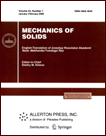 | | Mechanics of Solids
A Journal of Russian Academy of Sciences | | Founded
in January 1966
Issued 6 times a year
Print ISSN 0025-6544
Online ISSN 1934-7936 |
Archive of Issues
| Total articles in the database: | | 13427 |
| In Russian (Èçâ. ÐÀÍ. ÌÒÒ): | | 8178
|
| In English (Mech. Solids): | | 5249 |
|
| << Previous article | Volume 37, Issue 1 / 2002 | Next article >> |
| A. V. Petrovskii, "Stability and post-critical behavior of an inverted 3D pendulum under non-potential loading," Mech. Solids. 37 (1), 138-148 (2002) |
| Year |
2002 |
Volume |
37 |
Number |
1 |
Pages |
138-148 |
| Title |
Stability and post-critical behavior of an inverted 3D pendulum under non-potential loading |
| Author(s) |
A. V. Petrovskii (Moscow) |
| Abstract |
We consider an inverted pendulum with visco-elastic
gimbals between the links and study its behavior under
dead loads and follower forces. The stability of its states of equilibrium
is analyzed with respect to the control parameters (dead load and follower
force). The post-critical behavior of the pendulum is studied, in
particular, the stability of its periodic motion in the plane of its
initial stability loss.
The behavior of elastic systems subjected to non-potential forces (in
particular, follower forces) has been thoroughly studied in [1-6].
However in this field, there still remain many problems that are of
interest in the context of the nonlinear dynamics. In this
respect, an interesting and characteristic problem is that of the behavior
of an inverted pendulum subjected to a dead load and a follower force.
For instance, a pendulum may possess two mutually orthogonal principal
planes of rigidity and damping. The instability of such a pendulum occurs
in one of these planes. In this problem, apart from the usual factors
(non-potentiality of loads and damping) considered in the studies of the
post-critical behavior of systems, it is important to take into account the
interaction of the vibration modes in the two principal planes.
Moreover, it is interesting to analyze a combination of quasi-static
(divergence) and dynamic (flutter) types of instability. In this case,
secondary flutter may arise in the divergence region. This phenomenon was
discovered in aero-elastic systems [7] and was later studied in detail in
[8-10].
The present paper offers a systematic analysis of
equilibrium states of divergence type for an inverted 3D double pendulum,
as well as an investigation of
its motions in the flutter region. The main attention is given
to the stability of these states. Just as is the case for aero-elastic
systems, the phenomenon of secondary flutter occurs in the
divergence domain. In contrast to aero-elastic systems, where this
phenomenon is observed only if certain relations between partial damping
parameters are satisfied, the secondary flutter always takes place in the
pendulum case. |
| References |
| 1. | V. V. Bolotin, "On vibrations and stability of rods subjected to non-conservative
forces," in Turbine Installations [in Russian], pp. 23-42, Izd-vo AN SSSR,
Moscow, 1959. |
| 2. | V. V. Bolotin, Non-conservartive Problems in the Theory of
Elastic Stability [in Russian], Fizmatgiz, Moscow, 1961. |
| 3. | V. V. Bolotin and N. I. Zhinzher, "Effects of damping on
the stability of elastic systems subjected to non-conservative forces,"
Int. J. Solid. and Struct., Vol. 5, No. 9, pp. 965-989, 1969. |
| 4. | N. I. Zhinzher,
"Effect of dissipative forces with incomplete dissipation on the
stability of elastic systems," Izv. AN. MTT [Mechanics of Solids], No. 1,
pp. 149-155, 1994. |
| 5. | J.-D Jin,
"Bifurcation analysis of double pendulum with a follower force,"
J. Sound. Vibrat., Vol. 154, No. 2, pp. 191-204, 1992. |
| 6. | A. N. Kounadis,
"On the failure of static stability analysis of nonconservative systems in regions of
divergence instability," Intern. J. Solids and Struct.,
Vol. 31, No. 15, pp. 2099-2120, 1994. |
| 7. | V.V. Bolotin, A. V. Petrovskii, and A. A. Grishko,
"Secondary bifurcations and global instability of an aeroelastic nonlinear
system in the divergence domain," J. Sound and Vibrat., Vol. 191, No. 3,
pp. 431-451, 1996. |
| 8. | A. A. Grishko, A. V. Petrovskii, and V. P. Radin,
"The effect of internal friction on the stability of a panel
in supersonic gas flow," Izv. AN. MTT [Mechanics of Solids],
No. 1, pp. 173-181, 1998. |
| 9. | V. V. Bolotin, A. A. Grishko, A. N. Kounadis, and Ch. Gantes,
"Nonlinear panel flutter in remote post-critical domain,"
Intern. J. Nonlin. Mech., Vol. 33, No. 5, pp. 753-764, 1998. |
| 10. | V. V. Bolotin, A. A. Grishko, A. N. Kounadis, Ch. Gantes, and J. B. Roberts,
"Influence of initial conditions on the post-critical behavior of nonlinear
aeroelastic system," J. Nonlin. Dynamics, Vol. 15, No. 1, pp. 63-81,
1998. |
| 11. | V. V. Bolotin (Editor), Vibrations in Technology. Handbook.
Volume 1. Vibrations of Linear Systems [in Russian], Mashinostroenie,
Moscow, 1999. |
| 12. | A. A. Grishko, Yu. A. Dubrovskikh, and A. V. Petrovskii,
"On the post-critical behavior of dissipative nonlinear systems,"
Prikl. Mekh., Vol. 34, No. 6, pp. 92-98, 1998. |
|
| Received |
06 December 1999 |
| << Previous article | Volume 37, Issue 1 / 2002 | Next article >> |
|
 If you find a misprint on a webpage, please help us correct it promptly - just highlight and press Ctrl+Enter If you find a misprint on a webpage, please help us correct it promptly - just highlight and press Ctrl+Enter
|
|

 Russian
Russian  English
English